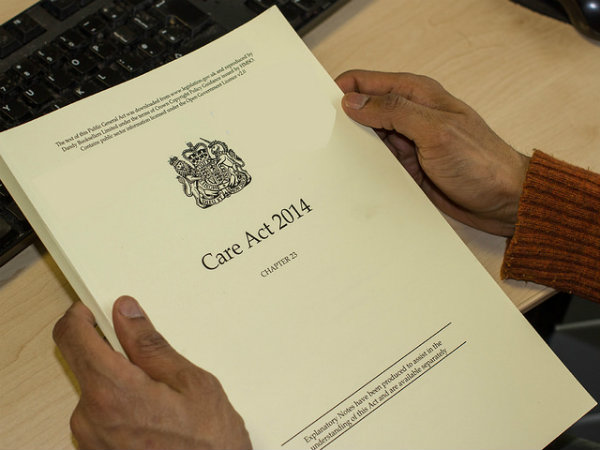
A disabled man has been given permission by the High Court to bring a legal challenge against a local authority’s decision to reduce his care package, in the first case to be linked to an alleged failure to meet the Care Act’s wellbeing principle.
Luke Davey, 39, is quadriplegic and has cerebral palsy. He was assessed as needing 24-hour care in 2015 and had a stable care package in place for 20 years. Over the past year Oxfordshire council took steps to cut the funding available to him. He says this would leave him able to afford 17.5 hours of support and left alone for six hours a day.
Davey is bringing a judicial review of the council’s decision on the basis it breached several statutory duties under the Care Act, including the duty to “promote an individual’s wellbeing” set out in section 1 of the Act and the duty to meet meeting an individual’s unmet eligible needs set out in section 18 of the legislation.
He will point to evidence from an independent occupational therapist who said the move to cut his care package posed significant risks to his wellbeing and independence.
Davey’s case will be heard in the High Court later this year and is the first legal challenge dealing with the Care Act’s wellbeing principle and care package provision duties. The only other Care Act-related challenge heard by the courts to date concerned advocacy provision.
Ahead of the hearing, the law firm Irwin Mitchell, which is representing Davey, has secured an interim court order meaning that the council must continue paying the full cost of his current package until the case is finished.
Davey’s care package had been joint funded by the council and the Independent Living Fund (ILF) up until the ILF closed in June 2015. At first the council continued to fund the full care package but then decided to reduce the funding available.
Rebecca Chapman a solicitor at Irwin Mitchell, said: “We will argue that the council has duties under the Care Act 2014 and has not taken into account the reasons why the reduced payments will have such a significant detrimental impact on Luke’s health and wellbeing.
“We are pleased that the court has granted the interim court order meaning his care needs will continue to be met. We now look forward to presenting Luke’s case at the Judicial Review later this year.”
Jasmine Davey, Luke’s mother, said: “I am 75 years old and have cancer. I cannot provide all the care that Luke needs. Luke is unable to make himself a drink or put himself to the toilet.
“The decision of the High Court came as a great relief to Luke and the family because it means Luke will be kept safe. It is just a shame that we had to take this matter to court and the council did not listen to our concerns and try to accommodate them which could have prevented the legal action.”
An Oxfordshire council spokesman said: “It would be inappropriate to comment at this stage pending consideration of this case by the Court. In the meantime we continue to work with Mr Davey and his family.”



 Bournemouth, Christchurch and Poole
Bournemouth, Christchurch and Poole  Hampshire County Council
Hampshire County Council  Oxfordshire County Council
Oxfordshire County Council  South Gloucestershire Council
South Gloucestershire Council  Wokingham Borough Council
Wokingham Borough Council  Webinar: building a practice framework with the influence of practitioner voice
Webinar: building a practice framework with the influence of practitioner voice  ‘They don’t have to retell their story’: building long-lasting relationships with children and young people
‘They don’t have to retell their story’: building long-lasting relationships with children and young people  Podcast: returning to social work after becoming a first-time parent
Podcast: returning to social work after becoming a first-time parent  How managers are inspiring social workers to progress in their careers
How managers are inspiring social workers to progress in their careers  Workforce Insights – showcasing a selection of the sector’s top recruiters
Workforce Insights – showcasing a selection of the sector’s top recruiters  Unlocking independence: how ASDAN gives care leavers choice and control over their future
Unlocking independence: how ASDAN gives care leavers choice and control over their future 

 Facebook
Facebook X
X LinkedIn
LinkedIn Instagram
Instagram
It was always going to take a while for the limitations of the Care Act to show themselves. I am not sure that it was ever fully realistic, to expect one Act to be able to ‘take up’ the expectations of the various Acts that preceded it. I look forward to seeing the outcome of this case.
A judge told me that this was a ‘good piece of legislation’.
I responded that I didn’t like the look of the Emporers new clothes.
This was a foney piece of legislation. It was slipped in on the QT against a back cloth of massive cuts to the income of the poor and disabled – juxtaposed against soring wealth for the rich.
It shouldn’t have been called the Care Act.
It should have been called the ‘Robber Barons’ act.
Ian Duncan ‘I repent’ Smith might even have understood the farce of the Care Act.
Reminds me a bit of the Community Care Act 1993 when an identical narrative of ‘needs met assessments’ was used to screw disabled and poor people; and yes The rich got richer in the process.
History repeating itself.
How would this case have been viewed if the client was left without any assistance for six hours every day in a nursing care setting?
A bit confused by the facts here as 6 hours during a 24 hour period would surely be sleeping hours?…am also assuming that the solicitors will be assisting with the lawful deprivation of liberty on the basis that the client’s mom appeared to be speaking on his behalf?
I was think the same. If this client does not require night support and assistive technology or community options can meet his needs then his wellbeing will not be in question.
Seems like the O/Thomas and Social Worker are not working together either
That’s why Zoe’s question of whether CHC has been explored is important, because perhaps if this man’s needs are so intense as to need actual 24 hour care then maybe this should be a jointly funded care package by both the LA and NHS, not just the LA.
I think there is a lot of detail that is needed to really understand what has been going on in this case.
Deprivation of Liberty doesn’t relate to ability to communicate, only to free movement and ‘liberty’. And it certainly wouldn’t relate to someone making a quote to the press.
24 hour care in this case may mean nighttime turning to prevent pressure sores, or toiletting, for example. He may also need medication, secretion suction, etc. I don’t his individual circumstances, but this kind of thing would be the norm in this kind of condition.
In the LA I work for 17.5 hours a day equates to around £240 a week at our agreed hourly rate paid to care agencies.
24 hour support (if needing someone always available in the home on a private basis) would cost over £2000 over 7 days (double this if needing 2 care workers).
My understanding is that the Care Act places a duty on LAs to offer appropriate services to meet those needs however the options to be made available to someone do not need to be exhaustive and can take into account value for money. In other words, a LA could deny someone 24 hour care at home over 7 days IF an alternative option, most likely to be residential care, could meet the same needs. The vagueness of the Care Act, however, around wellbeing causes a conflict in interest between not just the LA and the individual making the challenge but also the individual and the greater public interest because it in effect suggests that wellbeing trumps all, and that could mean that someone could argue that wellbeing means being in their own home in their own local area with their family and friends (shock horror!). This is great for the people who wish to use the Care Act to their advantage however the wider issue is that these challenges have to be financed and, if successful, it opens the floodgates to an expense that isn’t going to be possible to meet across the board.
Obviously that isn’t Luke’s problem, he has needs that simply need to be met and I applaud that someone will hold any LA to account to meet a duty that the Care Act implies. I think the only outcome in the end will be to look at changing the law to prevent those floodgates being opened, however, rather than result in bigger budgets for service users because there simply isn’t the money to do it. £2000 a week care packages, which potentially anyone could expect as an alternative to residential care if he is successful, is unsustainable.
Which LA do you work for where 17.5 hours of care per day costs £240 per week? That is less than £2 per hour!
I would like to know what responsibility health are taking to fund this care? CHC assessment should have been a consideration for a long term health condition.
actually getting chc despite being in a worse situation than “coughlan” is extraordinarily difficult
Emma just to say you have got it wrong re £2/hr it works out at £13.71/hr big difference
The OP quotes £240 per week as the cost of service, really it should be £240 per day.
240/17.5 = 13.71
£240 per week would mean a unit cost of 240/(17.5×7) = £1.95
Hope this begins to clear up the rest of the discussion!
Good luck hope you win your case ..it’s time there was a shake up . My mum was being left alone for up to 15 hrs over night in one position unable to even shift her position and totally unable to get a drink of water or get to the toilet..and this was deemed acceptable , she was assessed as being a social care need not a nursing care need so didn’t qualify for anymore help than 4 visits a day two 3/4 hr visits and two 1/2 hr visits . Totally unable to care for herself.
Scary what the UK health service is coming too , just don’t get I’ll or old is all I can say as sure as hell been an eye opener .